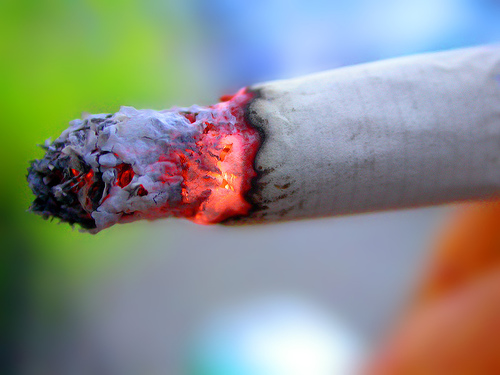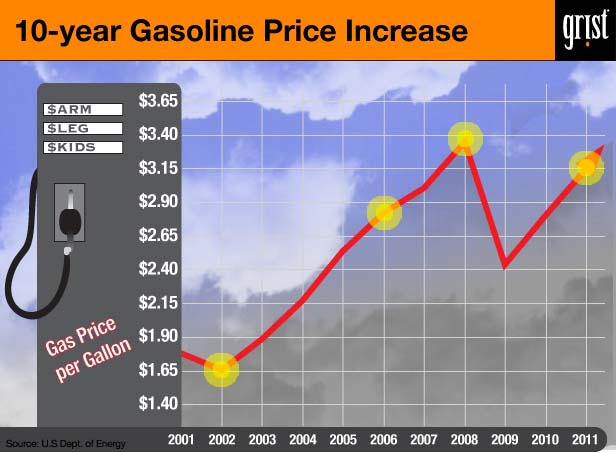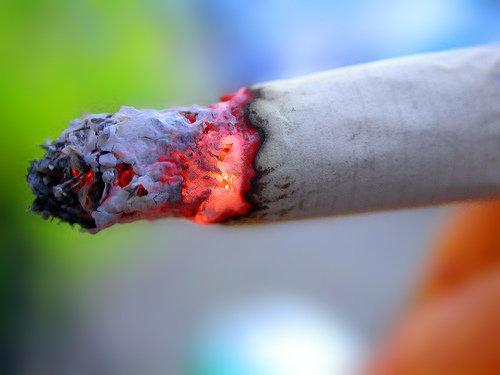Send your question to Umbra!
Q. Dear Umbra,
I’m a smoker. So, is it better to smoke organic tobacco? Will I put less of a strain on the planet by smoking e-cigarettes? Or can you make a case from a sustainability standpoint for why I should quit?
Thanks,
Greg
Potomac, MD
 Where there’s smoke, there’s fire.Photo: SuperFantasticA. Dearest Greg,
Where there’s smoke, there’s fire.Photo: SuperFantasticA. Dearest Greg,
Your letter comes at an interesting time in the history of the cigarette. A pack now costs around $13 in New York City, where the City Council last week voted to ban smoking outdoors. City parks, beaches, and plazas, including the pedestrian area in Times Square, are slated to go smoke-free when the law becomes effective this summer. Communities around the country are enacting their own cigarette bans. Last week also brought news that President Obama kicked his smoking habit. So quitting is in the air at the moment.
In the U.S. in 2009, just over 20 percent of all adults were smokers. That’s a whopping 46.6 million people. Worldwide, the numbers are pretty astounding. According to the World Health Organization, “The consumption of tobacco has reached the proportions of a global epidemic. Tobacco companies are cranking out cigarettes at the rate of five and a half trillion a year — nearly 1,000 cigarettes for every man, woman, and child on the planet.”
And because of those quantities, we’ve got a bit of a problem. The first is pesticides, pesticides, pesticides — and you can bet your tobacco has been sprayed right up to the moment of harvest and beyond. Every time you purchase a pack, you are supporting the chemical companies that are contributing to water pollution, deforestation, habitat destruction, and the poisoning of farmworkers and their families.
Finding local and organic versions of whatever it is you’re into consuming is a step in a more sustainable direction — but in this case it’s still a rather small step, though more organic options do seem to be entering the market.
Organic or not, if you smoke a filtered brand, you’ve still got a problem. Given the numbers of cigarettes being smoked worldwide, cigarette butts are the number one source of litter globally. Our global smoking habit leaves us with several trillion cigarette butts a year. If you’re expecting your butt to biodegrade, don’t hold your breath. Made out of cellulose acetate, they can take as long as any other form of plastic to break down.
What’s more, these butt-inskis end up in all sorts of places they ought not be — like inside fish, birds, whales, and other animals that mistake cigarette filters for food. When cigarettes get thrown on sidewalks, contrary to popular belief, there’s no magic butt man to sweep them up. If you do smoke, one of the most important things you can do is throw the filter in the trash.
But even in the trash, your cigarette butt is a toxic piece of litter. Those butts leach toxins where they’re tossed, too. The National Cancer Institute points out that “of the more than 7,000 chemicals in tobacco smoke, at least 250 are known to be harmful, including hydrogen cyanide, carbon monoxide, and ammonia (1, 4). Among the 250 known harmful chemicals in tobacco smoke, at least 69 can cause cancer.”
And wait, Greg, there’s more. Bisphenol-A (BPA), that endocrine-disrupting stuff we’re trying to stay away from? Well, it’s in cigarettes too. Then there’s the second-hand and even third-hand smoke — a little trail of pollution for posterity.
Rolling your own cigarette is probably the most environmentally friendly of all the options — if you use organic/local tobacco and a reusable filter. Rolling your own takes out the mechanization and all of the energy that goes along with it. So that’s an upside, I suppose. Avoiding disposable filters is a good thing to do too, but for health reasons (not that you’re weighing health reasons much if you’re smoking) a filter removes some amount of tar and nicotine you would otherwise be inhaling. You could employ reusable cigarette filters like this one, noted for being Hunter S. Thompson’s cigarette holder. Or make your own DIY reusable cigarette filter as seen in this gonzo video.
As for e-cigarettes, they are smokeless and buttless, which gives them a leg up, so to speak. But — and it’s a big butt — e-cigarettes require a not-so-sustainable disposable cartridge made of plastic in which the nicotine solution is stored, heated, and then thrown out. E-cigarettes have recently been banned on airplanes and are unregulated by any federal agency for safety and effectiveness. The Centers for Disease Control even says, “There is insufficient evidence that product modification strategies — including new cigarette products — to lower emissions of specific toxicants in tobacco smoke reduce the risk for major adverse health outcomes.” So save your money, Greg. Why support any part of an industry that harms human and environmental health?
Since you asked, I have to tell you there is no best cigarette, Greg. If you’re still reading and haven’t quit smoking by this paragraph, check out my missive to a smoker wanting to quit.
I have faith you can kick the habit. The next time you get the craving, take a deep breath and picture endless tobacco fields with planes flying overhead, spraying herbicide on underpaid, overworked laborers. That should help do the trick.
Encouragingly,
Umbra



